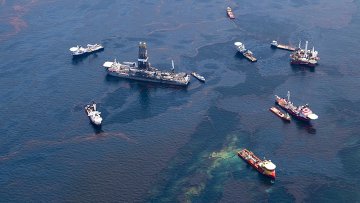Oil giant BP Plc claimed Wednesday a "significant milestone" had been reached in efforts to permanently seal the ruptured oil well in the Gulf of Mexico, while US estimates showed much of the spilled oil was now gone, dpa reported.
The company said its so-called "static kill" operation of pumping mud into the well had been successful. It described the development as a "significant milestone" in its attempt to place a permanent seal on the oil shaft, as the well appeared to have reached a "static condition."
In a further sign of progress, a US government analysis showed most of the millions of barrels of oil that gushed into the Gulf of Mexico were no longer in the water.
As much as three-quarters of the oil has been captured and burned off or dissipated, an accounting by the National Oceanic and Atmospheric Administration and the Department of the Interior showed.
Federal scientists estimate that 4.9 million barrels of oil have gushed from the well - worth 400 million dollars at Tuesday's oil price.
A third of the oil has been captured, burned or chemically dispersed; 25 per cent naturally evaporated or dissolved; and 16 per cent dispersed into microscopic droplets, the report said. Just over one quarter of the oil remains in the water or onshore.
Much of the remaining oil was in the "process of relatively rapid degradation," NOAA Administrator Jane Lubchenco said.
Pumping of heavy drilling mud into the well from vessels on the surface began late Tuesday and was stopped after about eight hours.
The well pressure was now being controlled by the hydrostatic pressure of the drilling mud, which was the "desired outcome" of the "static kill" procedure, BP said.
"The well is now being monitored, per the agreed procedure, to ensure it remains static. Further pumping of mud may or may not be required depending on results observed during monitoring," the statement said.
"This is a very significant step," Coast Guard Admiral Thad Allen, who is overseeing the government response to the disaster, told reporters.
If the mud injection succeeds in overcoming the upward pressure of oil in the well, which stretches 5 kilometres below the sea floor, engineers will proceed with pumping in cement.
Allen said the static kill ensures no further oil will leak into the environment, but stressed the well would not be considered permanently sealed until a relief well is completed later this month.
The well exploded on April 20, killing 11 workers and leading to what federal scientists say has become the biggest accidental oil spill in world history.
The permanent closure of the rupture can only be achieved through a parallel relief well, designed to intersect the original well shaft and allow the injection of cement. This could now happen as early as next week.
"A relief well remains the ultimate solution to kill and permanently cement the well," BP said.
Meanwhile, the Financial Times reported Wednesday that BP could face fines of up to 20 billion dollars for the oil spill under the US Clean Water Act if the company is found liable for gross negligence.
However, BP has said it is confident that no link will be established between the spill and negligent behaviour on its part.
The company has already set up a compensation fund of 20 billion dollars for victims of the spill and announced asset sales of up to 30 billion dollars in order to finance the consequences of the spill.
BP has taken a 32.2-billion-dollar charge for costs relating to the disaster, leading the oil giant to report late last month a record quarterly loss of 17.1 billion dollars as a direct result of the oil spill. They were BP's first losses since 1992.
Chief executive Tony Hayward, who had been severely criticized for his handling of the disaster, is to step down from his post on October 1. He will be succeeded by Bob Dudley, an American.






